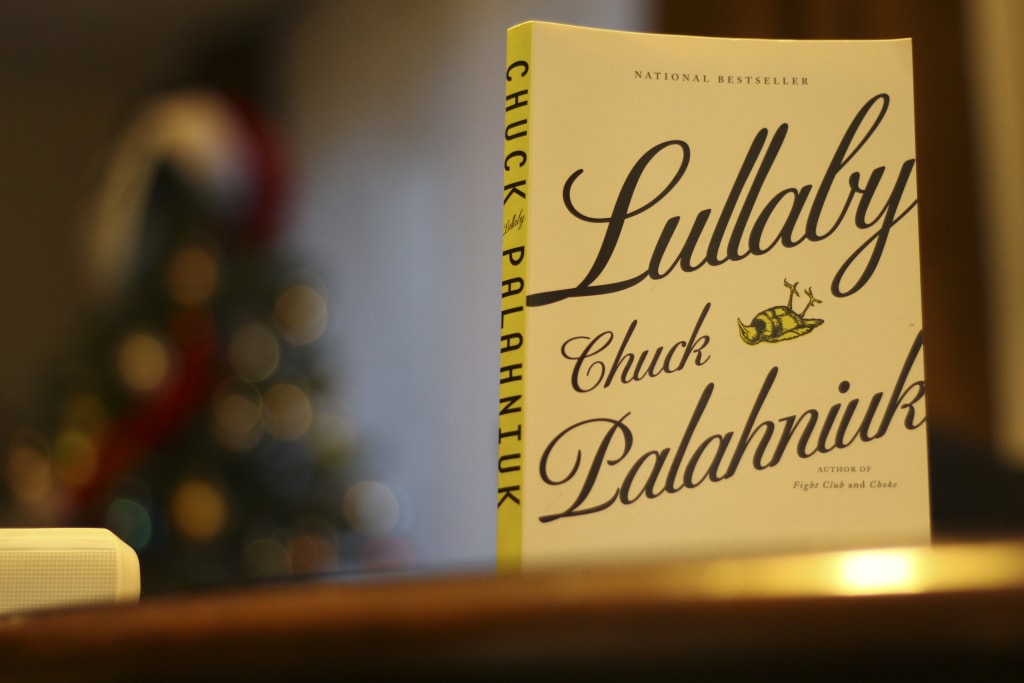Everyone is right, and Everyone is wrong - A review of "Lullaby" by Chuck Palahniuk
An opportunity to listen and to learn from others can prevent disastrous outcomes, or so it is told in this book. I find parallels between current events over the past year, and events within the novel itself. (Minor spoilers)

I didn't know what to expect when I picked up Lullaby. With so many events going on right now, and the polarizing environment of social media, I needed a break from all that. I wanted something relaxed, chill, maybe romantic. Well, this book is certainly romantic, but probably not the most relaxing. And despite my want to escape and ease my worries on our current political landscape, Lullaby provides an interesting response to current affairs, a message that can vary depending on your lifestyle and view of the world.
Lullaby is a novel – a horror novel - by Chuck Palahniuk, a last name I have serious trouble pronouncing. Is it Pala – CHUCK? Pala – NEW-ICK? Pala – NUCK? Anyway, he is the author of Fight Club, his most famous work that was made into a movie (remember, don’t talk about fight club). Lullaby starts with the protagonist narrating and sharing how he and his partner got to be witch hunters, and not quite like Hansel and Gretel: Witch Hunters mind you, but more because they started chasing two witches in the story. The narration of the two hunters are littered throughout the book, every five chapters or so, and Palahniuk distinguishes the present narration with the main story using italics. The story Carl tells comes together in the climax, with the narration of the present and the storytelling of the past blending to tell the morale of the entire book.
The main story follows Carl Streator, a journalist, and his investigation of children that died of unknown causes. The condition is called sudden infant death syndrome or SIDS, and Carl has lived experience with this since his own child died from this cause; however, we learn it wasn’t as random as are led to believe. As it turns out, Carl read from a book of poetry that he found years ago to his wife and son, and he learns that very poem he read is the one responsible for these deaths, a poem titled "The Culling Song."
"The Culling Song" is a lullaby that originated from an African country’s tribe with the intention of sending an injured or dying tribesman to the other side. We learn the writer of the book of poems was really looking to make a quick buck by collecting random poems and stories together, essentially ripping off the original authors. Carl finds what appears to be the poem in one of the homes, so he takes it, and after going back to the office to report to his editor, Carl accidentally kills him, then a neighbor, and then some random people he is walking by the next day. He also accidentlaly shares it with a paramedic that we learn is a necrophiliac, and he uses the poem on models to fulfill this fetish.
The poem, we learn, is actually a sorcerous spell that can be made stronger based on the experiences of the individual that recites it. A sense of loathing and anguish can strengthen the spell so much that reciting it isn’t even required, merely thinking the poem is enough to kill someone, which Carl learns during his encounters. Some Jedi-mind tricks up in here!
Carl meets with Helen Hoover-Boyle, a real estate agent with a fondness for pink, who tells him about the poem and its power. Helen has a history with the poem, and now uses it to assassinate all manner of people, and has ties with many government officials in other countries. Her assistant, Mona Sabaat, tells them about her wiccan group and invites them to come and learn more about spells, and how to harness this power Carl has. Mona also shares with them the history of a “Grimoire,” a book of spells said to contain the culling song, but also other spells like taking over someone’s body, one of flight, and even the ability to resurrect the dead, which appeals to both Carl and Helen. The two arrive first, and then meet all manner of witches that all strip naked and talk like normal, because that is a thing. Something about returning to nature?
Carl and Helen pay the nakedness no mind, but then meet Mona’s boyfriend, Oyster, an extremist of progressive ideas. His extremism is displayed when he shouts and ridicules Carl for bringing a store-bought salad that contained caesar dressing - anchovies is in the dressing, which Carl had no idea of. I think there is a meme going around about this kind of person… Anyway, the two learn more about Oyster, and they learn that he wants the culling spell and the grimoire for other deeds, ones that would lead to huge progressive change, while killing those that refuse to change. This beckons Carl to find a solution and do something to ensure that doesn’t happen, and this leads to all four of them going on a journey to find the grimoire and copies of the book that contain the culling song.
Carl is on the hunt because he wants to destroy the grimoire and any copies of the culling song to ensure Oyster or anyone like him doesn’t succeed, Helen wants it to control the world under her own rules, while Mona and Oyster want the grimoire to force change in an almost authoritarian way.
What Chuck does with Lullaby is throw progressive ideas with conservative ones, and then puts power into the pit to watch them fight for it. It is dark, comical, satirical of change and progressive actions, and grotesque at times. Palahniuk has a minimalist way of writing, repeating sentences and phrases in each chapter, and yet it flows really well. It’s like an off-the-hook story you might hear at a bar that has some lessons, satirical ones at that.
The romancing saga of Carl’s renewed vigor at doing something that could avenge the deaths of his wife and child, the new “family” dynamic he has with his new comrades, and the blooming romance with Helen (despite the gruesomeness of the deaths he witnesses), the violence he and others enact, and the darkness of the human condition all draw Carl to a newfound path after his lonesome, loathsome, loser-like existence. A horror that is also romantic? Well, Lullaby is not like Mary Shelley’s Frankenstein since it could be viewed as transgressive, but it does have some romantic themes with calls to better times, individualistic tendencies of characters like Oyster, and has emphasis on emotions like horror.
I got to say though, it really pokes fun at both ideas, but particularly progressive ones. And that is not to say they are bad ideas, but the satire is really speaking on the ridiculousness and want of a better approach. In one chapter that has Carl and his partner continuing the search for witches, we learn of a talking cow at a slaughterhouse. The cow talks with all the workers at the farm and is treated like a messiah. The cow recants the horrors of slaughter, the feelings and emotions that they have for one another, and asks them to think about killing them for sustenance. I have been thinking and making changes to reduce and outright get rid of meat from my diet entirely, but sometimes the methods to talk to people about it are so…well, let’s just say if you continually make someone feel bad and shame them, it can actually embolden them to stay put, which speaks to how unproductive shame can be. Oyster is largely this kind of progressive. His ideas actually make sense, and his view of the world is one I see and can agree with even, but his extreme method of pushing these ideas forward will lose him support, but of course that is why he wants the culling song, to kill those that oppose.
Palahniuk has funny way of displaying how similar everything is. Even with Fight Club and Tyler Durden’s want to empower the men into being alpha males; it actually goes in a direction of authoritarian rule. It is so easy to become what you hate. Even now with BLM, the anti-vaxxers or anti-maskers with regards to COVID-19, both can really punish and shame others into changing, which hasn’t worked for the people they are reaching out to. I don’t like being called a sheep, a libtard, an idiot, a racist, a communist, a selfish capitalist, a beta-cuck, a toxic male, or a hick. Since when is it OK to insult someone into submission? Part of what makes humans so damn cool is the uniqueness of our stories, and everyone has something to say and they carry personal values that they want heard. But man, it can be so hard to share when there is already a preconceived notion on the person you think is different.
Carl talks about how the culling song could become a plague, and he speaks on all the methods the governments might use in order to prevent people from hearing it. Measures for headphones, banning words, ear coverings, patrols to ensure quiet, people listening to make sure nobody is saying the poem, and so on. He also says, “It is hard to say if that world would be any worse than this, pounding music, the roar of television, the squawk of radio. Maybe without Big Brother filling us, people could think.”
Makes me think of the anti-vaxxers theory of chips being inserted into us via the COVID-19 vaccine, all while using a phone to tweet and share these thoughts. Such bliss though.
While Carl and his partner chase these witches, perhaps another way is the key. Yes, he has found a purpose, but is it a fruitless one?
Patience and listening are pretty important, both on the side of bringing awareness, but also on the one that might say no. Does the opposition towards an idea exist because the idea is dumb, or is it because of the authoritative way it was said? Maybe the journey of Carl, Helen, Oyster and Mona would have been different had they all listened to each other, instead of thinking they were right and dismissing their ideas. And I think Chuck shows us this in the most nuanced, violent, eccentric, and hilarious way.
About the Creator
Alejandro Melgar
Alejandro Melgar is a former fitness professional turned journalist. In his early thirties, Melgar has worked various vocations throughout his twenties, and is now cultivating his writing through fiction while continuing to write news.






Comments
There are no comments for this story
Be the first to respond and start the conversation.